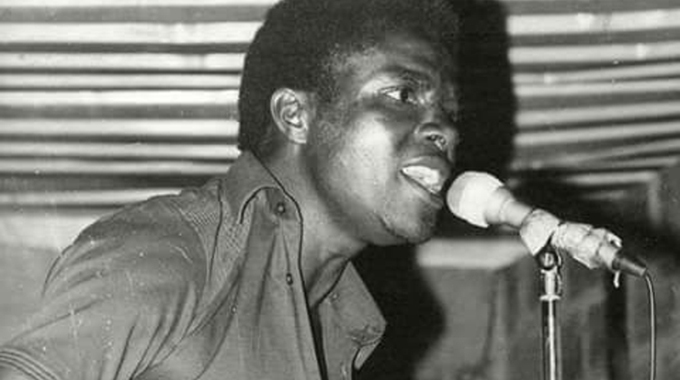Digital theatre praised for fostering positive health and nutrition behaviours

Cynthia Ncube
When the chance to use digital theatre to disseminate information on COVID-19 and Nutrition to the Zimbabwean populace came up, Sandra Ndebele, a multi award winning female musician and actress latched on to the opportunity because for her – art is meant to contribute positively to the well-being of people and their communities.
“It was such an honour for us as artists to be part of the Ministry of Health and Child Care, National Arts Council and UNICEF project, we were so humbled to be given a chance to sensitise people on COVID-19 and nutrition issues through multimedia such as selfie videos, music jingles and radio skits that were shared on various platforms,” Ndebele said.
She said working on the project gave her a chance to speak more about the importance of traditional food and its nutritional value to people.
“Getting a chance to talk about the traditional foods we have in the country was an amazing experience. Developing the content made us aware, even as artists, of the richness of the food we have in Zimbabwe. This is the kind of work I wouldn’t mind doing repeatedly,” she said.
Wadzanai Mufukari, a paediatrician, wife and mother living in the capital city of Harare, found the selfie videos to be helpful after seeing them on Twitter.
“The videos I remember seeing were encouraging breastfeeding in the context of COVID-19. They addressed my concerns around breastfeeding a toddler as a frontline health worker. It was good to get that kind of support,” she said.
Zimbabwe is facing a double COVID-19 and drought emergency, which has resulted in challenges within the health sector, the economy, and loss of livelihoods due to the COVID-19 lockdown.
The drought emergency has resulted in deterioration of the food security situation in the country, with an increase in the number of children with acute malnutrition resulting from food insecurity, compromised childcare and feeding practices due to negative coping mechanisms.
Overcoming challenges
The Ministry of Health and Child Care (MOHCC) in partnership with UNICEF, launched an integrated communication for development response to address negative practices and social norms to achieve improved feeding and childcare practices for mothers and children under 2-years-old, whilst addressing COVID-19 and other related areas during emergencies. The initiatives were funded through the support of the Central Emergency Response Fund (CERF) and the Health Development Fund (HDF).
As part of this campaign, a digital theatre initiative was born, aiming to provide edutainment while at the same time providing important information about nutrition and COVID-19. The initiative, delivered through a partnership with the National Arts Council of Zimbabwe (NACZ), a governing body for artists, was geographically, gender, youth and disability inclusive. The initiative produced radio theatre skits, videos and music jingles in English, Ndebele and Shona. The content included COVID-19, Nutrition, WASH and other health issues. The materials were tailored for different audiences including adolescents, adults as well as people living with disability and impairments.
The artists who collaborated with NACZ in this venture included musicians, poets, comedians, actors and social media influencers. These celebrities served as role models and peer to peer influencers. The products that were developed through this initiative reached more than 8 million people countrywide through radio and social media platforms.
Speaking to the nation, delivering hope
According to The Postal and Telecommunication Regulatory Authority of Zimbabwe (Potraz) mobile internet and data traffic use has increased by 56 percent this year. Digital theatre has the unique advantage of reaching many people in line with COVID-19 regulations as well as provide information and entertainment at the same time. Radio remains a hugely popular and accessible channel in Zimbabwe.
Taurai Moyo, a coordinator for Chenhaka Trust theatre group said the project articulated the role of drama in shifting community norms and behaviours.
“Drama is a very powerful communication tool as it engages directly with the audience and provides edutainment at the same time. Radio dramas are a great strategy to reach people in this COVID-19 era. Indeed, drama groups can play a bigger role in shifting community norms and behaviours” he said.
The activities brought together different artists across all genres for a common purpose to disseminate information on health and nutrition. Besides the fact that traditional communication methods are constrained during this time, this mix of individuals resulted in exceptional, interesting, exciting and artistic end products. Employment opportunities were also created for many artists who were out of work due to the COVID-19 lockdown measures.
Mr Rodney Rwende, the communication officer for NACZ, said working with various artists was a great, fulfilling experience. He added that continuation of the project with a wider focus was NACZ’s aim to fulfil its mandate of reaching the Zimbabwean masses with topical information through edutainment.
Other well-known artists and influencers involved include Tamy Moyo, Selmor Mtukudzi, Misred, Aleck Mavhakacha, Kapfupi, Willis Wataffi, Doc Vikela, Khulekani Ndlovu, Lameck Rashai, Jays Marabini, Tatenda Chinoda Dhege, Sithandazile Dube, Nqobile Malinga, Mono Mukundu, Hope Masike, Clemence Magwaza, Desire Moyo, Baba Harare, Legion Wilton Doba and Clatoh Fyre.
Drama groups included Umkhathi Theatre Works, Chenhaka Trust, Zvido Zvevanhu, Edzai Isu Trust, Berina Arts, Ziya Trust, My Age Theatre, Bambelela Arts Ensemble, Yambiro Theatre and Icon Theatre.
Sandra Ndebele said there is need for communities to do more adding that that she learnt a lot especially about COVID-19 during this project.
“After doing the music jingles and selfies I became aware as an artist, of COVID-19 prevention measures. I learnt that in as much as we are sensitising others, we also need to protect ourselves. To everyone in Zimbabwe, let us not wait for UNICEF, MoHCC or NACZ to come to us and tell us what to do, let us all be our own ambassadors and fight COVID-19 together,” she said.









Comments